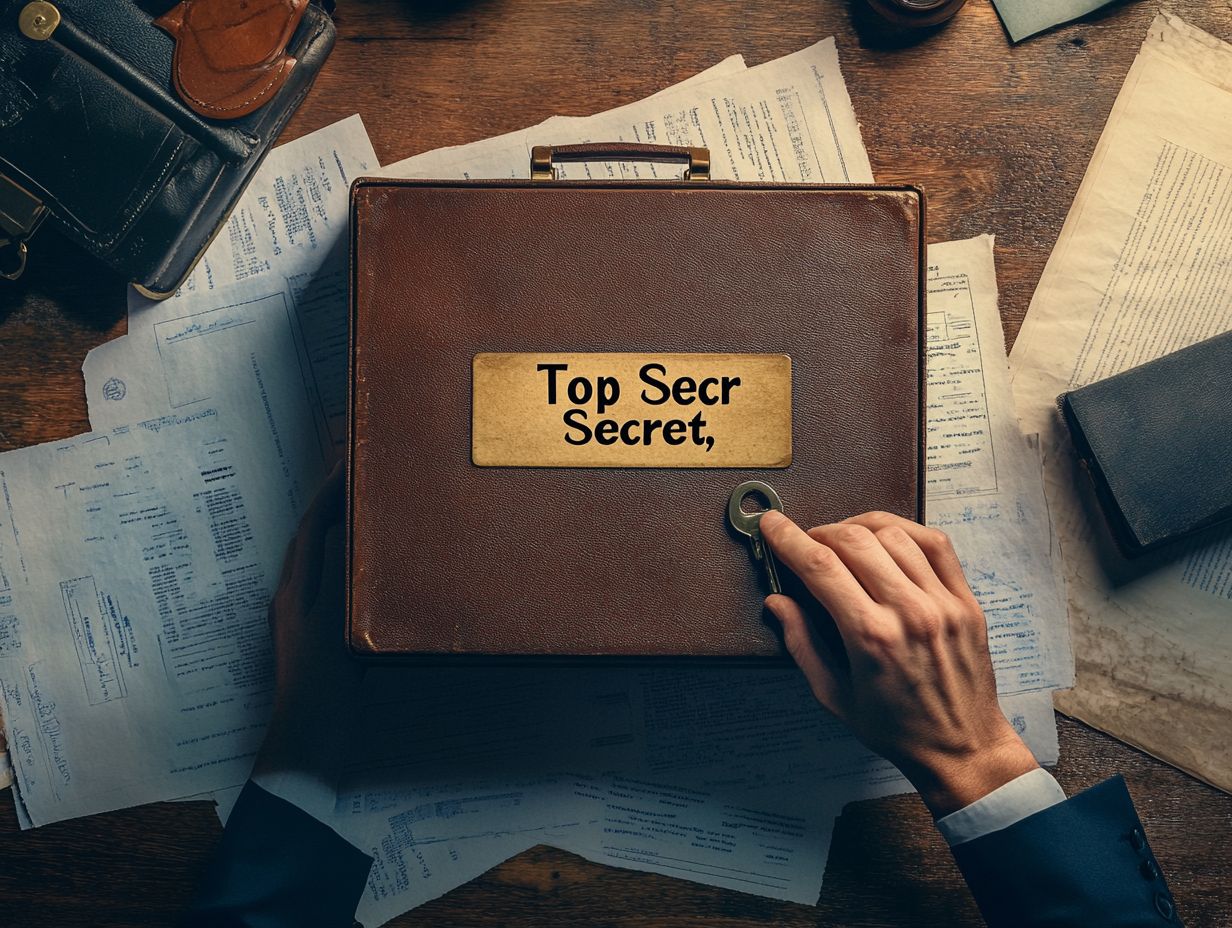How to Keep Your Defense Strategy Confidential
In today s legal landscape, maintaining confidentiality in your defense strategy is paramount. This article delves into the importance of confidentiality, highlighting the protective measures provided by attorney-client privilege and the potential repercussions of any breaches.
You will uncover effective strategies for safeguarding your defense approach, identify common pitfalls to avoid, and learn the necessary steps to take if confidentiality is compromised.
By prioritizing confidentiality, you can fortify your defense and enhance the outcomes of your legal matters.
Contents
- Key Takeaways:
- The Importance of Confidentiality in Defense Strategy
- Understanding Attorney-Client Privilege
- Ways to Keep Your Defense Strategy Confidential
- Common Mistakes to Avoid
- What to Do if Confidentiality is Compromised
- Frequently Asked Questions
- What measures can I take to keep my defense strategy confidential?
- Is it necessary to keep my defense strategy confidential?
- How can I securely store my defense strategy?
- What should I do if I suspect a breach of confidentiality?
- Can I discuss my defense strategy with my colleagues?
- Are there any legal repercussions for not keeping my defense strategy confidential?
Key Takeaways:

Confidentiality is crucial in defense strategy to protect sensitive information and avoid potential negative consequences. Attorney-client privilege is a legal protection that safeguards communications between a client and their attorney. Understanding and maintaining this privilege is essential to keep your defense strategy confidential. Strategies such as limiting access to information, using secure communication methods, and properly disposing of documents will help maintain confidentiality in your defense strategy.
The Importance of Confidentiality in Defense Strategy
In today s digital landscape, you can’t underestimate the vital role of confidentiality in a defense strategy. It serves as the cornerstone for effective legal representation, safeguarding sensitive personal information and ensuring that confidential communications remain intact.
Upholding data protection and client confidentiality is essential not just for adhering to legal obligations, but also for building trust between you and your attorney. A solid defense strategy must integrate stringent privacy rights and data confidentiality measures to thwart potential data breaches.
Such breaches can lead to serious repercussions, including identity theft and unwelcome exposure to malicious insiders. The importance of confidentiality in your defense strategy cannot be overstated; breaches can lead to catastrophic outcomes, including identity theft and the loss of sensitive data, which ultimately jeopardizes your legal representation.
Recent data breaches illustrate the serious risks of confidentiality violations. For instance, a law firm s database breach exposed sensitive client information, forcing numerous legal cases to be reevaluated and severely tarnishing the firm s reputation. Such examples underscore the need for legal professionals like yourself to strictly adhere to established privacy guidelines, such as the American Bar Association s Model Rules of Professional Conduct.
By implementing robust security measures and regularly training your staff on data protection protocols, you can proactively mitigate the risks associated with potential data breaches, ensuring the safety of both your clients and your practice against the threats of identity theft and compromised information.
Understanding Attorney-Client Privilege
Attorney-client privilege stands as a cornerstone of the legal system, offering critical protection for your confidential communications with your attorney. This vital principle ensures that sensitive information remains secure and is shielded from disclosure, except in situations where there is just cause.
Your right to confidentiality is not merely a formality; it is a fundamental aspect of receiving effective legal representation. Attorney-client privilege is your shield, protecting the confidential information you share with your attorney.
What It Protects and How to Maintain It

This privilege covers a range of sensitive information, including legal advice, client identities, and any documents that could reveal personal or financial details. To uphold this confidentiality, you and your legal representatives should embrace best practices, such as:
- Using encrypted communication channels
- Securely storing documents
- Limiting access to sensitive information
By implementing robust data protection strategies like conducting regular audits and providing employee training on privacy practices you will significantly boost your protection around this essential relationship with your attorney.
Ways to Keep Your Defense Strategy Confidential
To maintain the confidentiality of your defense strategy, it s crucial to implement strong cybersecurity methods, utilize secure document destruction techniques, and provide continuous education for everyone involved in managing confidential documents and communications.
This comprehensive approach will safeguard your sensitive information and empower your team to uphold the highest standards of security.
Strategies and Techniques for Maintaining Confidentiality
Implementing strong data security training, robust network security, and effective access controls is essential for maintaining confidentiality in legal practices. By doing so, you help prevent unauthorized access to sensitive information.
To elevate your security efforts, focus on integrating security keys and advanced authentication methods. These provide an extra layer of protection against potential breaches, ensuring that your confidential data remains secure.
Comprehensive fraud prevention measures are critical. Monitoring for unusual activity and conducting regular audits can further safeguard your sensitive information.
Continuous data security training is key to fostering a culture of confidentiality within your organization. By equipping employees with the knowledge to recognize threats and adhere to best practices, you create an informed team ready to handle potential risks.
Regular workshops and updates reinforce these concepts and reduce the likelihood of human error, promoting accountability among team members and strengthening your overall security posture.
Common Mistakes to Avoid
Avoiding common mistakes is essential for maintaining confidentiality in your defense strategies.
Oversights can lead to significant data breaches, employee errors, and increased vulnerabilities to malicious insiders or phishing schemes that jeopardize sensitive information.
Be precise in your actions to protect your critical data and bolster your defenses against potential threats.
Potential Breaches and How to Prevent Them

Confidentiality breaches can spring from cyber attacks, employee missteps, or malicious insiders. However, by implementing strong cybersecurity strategies and fraud prevention measures, you can significantly mitigate these risks.
These breaches manifest in various forms, including phishing schemes, ransomware attacks, and unauthorized access to sensitive data. Contributing factors typically involve outdated software, inadequate employee training, and insufficient security protocols.
To effectively combat these threats, regularly update your software, conduct thorough background checks on employees, and establish clear access guidelines.
Build a vigilant culture. Train employees to spot suspicious emails and unexpected requests for information, empowering them to safeguard not only their own data but also the integrity of the organization as a whole.
What to Do if Confidentiality is Compromised
If confidentiality is compromised, you must act quickly to minimize any damage. This includes:
- Promptly notifying affected parties
- Informing law enforcement if the situation warrants
- Strictly adhering to compliance policies to uphold legal rights
- Ensuring data protection standards are met
Steps to Take and Legal Options
In case of a confidentiality breach, seeking legal representation becomes essential for navigating the intricate landscape of potential legal options available to you, including filing for protective orders and gathering evidence to bolster your case.
It s crucial to act promptly, as delays can hinder your efforts to recover lost information or prevent further misuse. Legal counsel can guide you through the complexities of reporting the breach to the relevant authorities and assist in drafting the necessary documentation for formal complaints.
Effectively utilizing legal channels not only strengthens your case but also underscores the seriousness of the breach, making it clear that repercussions will follow. Protective orders are vital in this process, establishing guidelines that safeguard any remaining confidential details, ensuring they are not further compromised during the investigation.
Frequently Asked Questions
What measures can I take to keep my defense strategy confidential?

There are several steps to keep your defense strategy confidential. Limit sharing your strategy to only those who need to know.
Use secure methods like encrypted emails or phone calls. Think about using confidentiality agreements with third parties involved.
Is it necessary to keep my defense strategy confidential?
Keeping your defense strategy confidential is crucial. It helps maintain an element of surprise and prevents your opponents from preparing a counterattack.
How can I securely store my defense strategy?
Store your defense strategy in a password-protected digital format. Use strong, unique passwords and consider digital file encryption software.
For physical storage, use a locked cabinet or safe.
What should I do if I suspect a breach of confidentiality?
If you suspect a breach, act swiftly. Inform your legal team immediately to minimize damage.
Assess the potential fallout and seek legal action if necessary against the responsible party.
Can I discuss my defense strategy with my colleagues?
Discussing your defense strategy with colleagues is generally not recommended. Only share it with those directly involved in the case to prevent leaks.
Are there any legal repercussions for not keeping my defense strategy confidential?
Yes, not keeping your defense strategy confidential can lead to legal issues. If you’re bound by a confidentiality agreement, violating it may result in legal action from the other party.
Consider the consequences carefully before sharing any information about your defense strategy.






